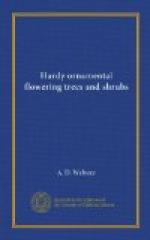CYTISUS.
CYTISUS ALBUS.—White Spanish Broom. Portugal, 1752. This is a large-growing shrub of often 10 feet in height, with wiry, somewhat straggling branches, and remarkable for the wealth of pure-white flowers it produces. In May and June, if favourably situated, every branch is wreathed with small white flowers, and often to such an extent that at a short distance away the plant looks like a sheet of white. Being perfectly hardy and of very free growth in any light soil, and abundantly floriferous, this handsome shrub is one of particular value in ornamental planting. By placing three or five plants in clump-fashion, the beauty of this Broom is greatly enhanced.
C. ALDUS INCARNATUS (syn C. incarnatus) resembles C. purpureus in its leaves and general appearance, but it is of larger growth. The flowers, which are at their best in May, are of a vinous-rose colour, and produced plentifully.
C. BIFLORUS (syn C. elongatus).—Hungary, 1804. This is a dwarf, spreading, twiggy bush, of fully a yard high. Leaves trifoliolate, clothed beneath with closely adpressed hairs, and bright yellow, somewhat tubular flowers, usually produced in fours.
C. DECUMBENS.—A charming alpine species, of low, spreading growth, bright-green three-parted leaves, and bearing axillary bunches of large yellow, brownish-purple tinted flowers. A native of the French and Italian Alps, and quite hardy.
C. NIGRICANS.—Austria, 1730. Another beautiful species, with long, erect racemes of golden-yellow flowers, and one whose general hardihood is undoubted. On its own roots, and allowed to roam at will, this pretty, small-growing Broom is of far greater interest than when it is grafted mop-high on a Laburnum stem, and pruned into artificial shapes, as is, unfortunately, too often the case.
C. PURPUREUS.—Purple Broom. Austria, 1792. Alow, spreading shrub, with long wiry shoots, clothed with neat trifoliolate leaves, and bearing an abundance of its purple, Pea-shaped flowers. There is a white-flowered form, C. purpureus albus, and another named C. purpureus ratis-bonensis, with pretty yellow flowers, produced on long and slender shoots.
C. SCOPARIUS.—Yellow Broom. This is a well-known native shrub, with silky, angular branches, and bright yellow flowers in summer. There are several varieties, but the most remarkable and handsome is C. scoparius Andreanus, in which the wings of the flowers are of a rich golden brown. It is one of the showiest shrubs in cultivation.
For ornamental planting the above are about the best forms of Broom, but others might include C. austriacus, C. Ardoini, and C. capitatus, the latter being unusually hardy, and bearing dense heads of flowers. In so far as soil is concerned, the Brooms are readily accommodated, while either from seeds or cuttings they are easily propagated.




